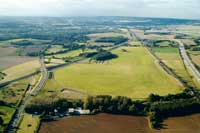How Farm Business Survey data can help you

The Farm Business Survey is best known for producing DEFRA’s Total Income From Farming figure – but few realise the potential it offers as a valuable – and free – benchmarking opportunity.
DEFRA uses the annual Farm Business Survey as its principal thermometer to take the temperature of farming in England and Wales. The findings of the survey inform how DEFRA shapes government policy, but the data also goes even further afield – FBS information even makes its way to Brussels.
The survey, which records details of about 2000 farming operations in England, is carried out by a consortium of six universities and colleges on DEFRA’s behalf. Similar studies are run in Wales and Scotland.
Paul Wilson, associate professor of management at the University of Nottingham, is the chief executive of Rural Business Research, which runs the Farm Business Survey. “The FBS is a very long-established research survey for government – it’s been going since 1936.
“TIFF is the thing that everyone reads about. For instance, there’s a lot of interest at the moment about whether TIFF in 2010 will break the £4bn mark or come in below it. But the FBS data goes far further than that – banks and consultants use it as a benchmark and it feeds in to reference texts like the John Nix Pocketbook and the ABC Book.”
Many farmers are surprised that they can’t volunteer to take part says Dr Wilson. “Farmers are initially approached to join the survey by letter from their local university or college in the consortium. Researchers seek tor recruit new farmers from random lists generated by DEFRA – we can’t choose farms by business type or size or even willingness to engage, so the survey is as unbiased as possible.”
A study of this size and importance requires far more than a telephone chat or completing an online form. An FBS researcher will visit the farm and interview the farmer or farm manager extensively, collecting information on stock numbers, crops, machinery and land. The farm’s books – studied confidentially – also help produce a thorough picture of the farm business.
“From all this information we produce a fully reconciled set of management accounts for each farmer who has co-operated in the survey. It’s a true, economic and financial picture of the business – it’s not a set of accounts prepared for tax purposes,” says Dr Wilson.
The survey also generates a complete set of data for a participating farmer’s farm type and region – so they also get some data beyond their own farmgate, against which to benchmark their business.
Most participating farmers stay within the survey for several years, Dr Wilson says, up to a maximum of 15 years.
Rural Business Research is about to begin collecting data for the 2011 survey in January, covering farms financial years ending from 31 December 2010 to 5 April next year.
The benchmarking opportunity that FBS data offers farmers is significant, reckons Dr Wilson. And it’s for this reason that a lot of investment has been put into making the service available to farmers online.
“There’s no commitment needed from farmers to use the online service – they don’t have to submit any of their own data to the system. And the way the data is segregated allows farmers to compare their own businesses’ performance against the top-performing operations, not just the survey average.”
For example, farmers can choose to see how their business compares to the survey data on cereal or milk yields, gross margins, or on a whole farm basis. Arable and dairy farmers can also examine how they stack up at EU level.
“The 2009/10 data revealed a significant differential between the top 25% and the lower quartile of farms in the survey – gross margins of £1230 a milking cow and £484 a cow. And milk yields varied greatly, from 8100 litres a year to 5850 litres a year.”
Dr Wilson is now preparing to take the FBS message out on the road with a series of workshops (see below). “We want to show people how much value they can get from the FBS. The fact is that benchmarking really can help your business. The evidence that the FBS itself collects shows that farmers who undertake benchmarking are the ones that perform better.”
Benchmark your business:
You can check out how your farm business compares to the Farm Business Survey data.
Read FBS researchers’ sector reports by clicking on “RBR Publications”
Farm Business Survey workshops 2011:
* East of England – 2 February Chilford Hall, Linton, Cambridgeshire CB21 4LE
* North East – 9 February Cockle Park Farm, Morpeth, Northumberland NE61 3EA
* North West – 10 February Newton Rigg, Penrith, Cumbria CA11 0AH
* East Midlands – 15 February Sutton Bonington Campus, Loughborough, Leicestershire LE12 5RD
* Yorkshire and the Humber – 18 February Askham Bryan College, York YO23 3FR
* South West – 22 February Duchy College, Stoke Climsland Campus, Cornwall PL17 8PB
* South East – 2 March University of Reading RG6 6AR
* West Midlands – 9 March Worcester Racecourse WR1 3EJ
